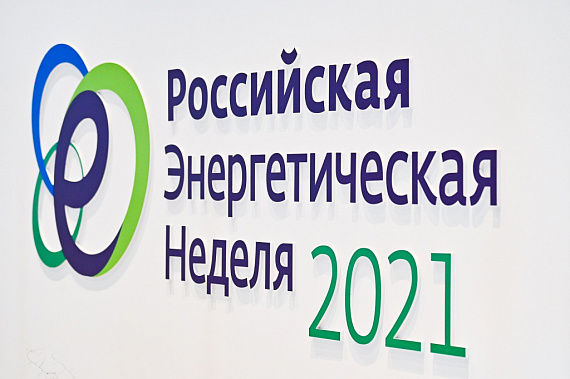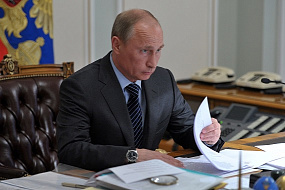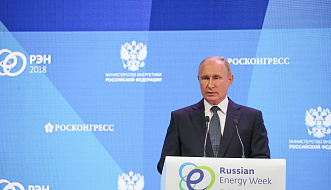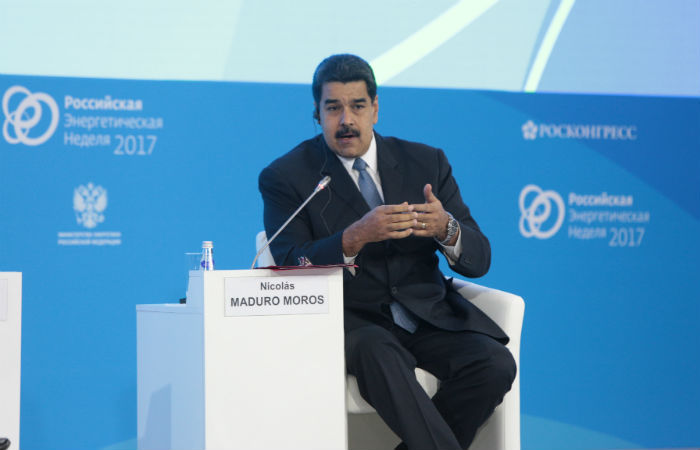Outcomes of Russian Energy Week International Forum 2021

Russian Energy Week is an international event which provides a platform to discuss the main economic challenges in energy, as well as current issues concerning the development of the fuel and energy sector. This year’s edition of the Forum took place in Moscow on 13–15 October 2021. It was organized by the Roscongress Foundation, the Ministry of Energy of the Russian Federation, and the Moscow City Government. The event brought together 2,500 participants from more than 80 countries, while the business programme included 32 events featuring 204 speakers.
“This was the fourth edition of Russian Energy Week, and interest in the Forum’s agenda has only continued to grow with each passing year. The event invariably attracts the attention of key players in the fuel and energy sector. And as a key player in the global energy market, Russia possesses enormous potential for economic growth, given the technological breakthroughs being made in the industry; the synergy that exists between the industrial, scientific, and business communities; and the emergence of new energy sources,” said Adviser to the President of the Russian Federation and Executive Secretary of the REW Organizing Committee Anton Kobyakov.
Business programme
The Forum hosted a series of business events, with the main one being the plenary session entitled “Global Energy: Transformation for Development”, which was held with the participation of President of the Russian Federation Vladimir Putin.
Other key figures to speak at the plenary session included Chief Executive Officer of BP Bernard Looney, Chairman of the Board of Management of Daimler AG and Mercedes-Benz AG Ola Källenius, Chairman and Chief Executive Officer of Exxon Mobil Corporation Darren Woods and Chairman and Chief Executive Officer of TotalEnergies Patrick Pouyanne. The session was moderated by CNBC anchor Hadley Gamble, and a video address was given by João Manuel Gonçalves Lourenço, President of Angola (which assumed the OPEC presidency in 2021).
The discussion focused on the most important and pressing issues facing the development of Russia’s fuel and energy sector. These included recovery in the wake of the crisis caused by the COVID-19 pandemic, the role played by OPEC+ agreements in stabilizing the market, key aspects related to relations with importers of Russian commodities, and the importance of energy conservation and implementing climate agreements.
“The impact of the pandemic, and the shock sustained by regional energy markets have once again served to demonstrate how important a stable and robust fuel and energy sector is for today’s world, and how important it is to supply consumers with affordable energy while minimizing the impact on the environment.
“In order to ensure the planet’s energy security and environmental safety, measured and responsible action needs to be taken by all participants in the market, from producers to consumers. This action needs to focus on the long term, and be in the interests of sustainable development in our countries, so as to ensure prosperity for our peoples,” said Vladimir Putin at the plenary session.
A firm position was articulated at a session entitled “The Future of Traditional Energy: Is the World Ready to Eschew Hydrocarbons?”: Russia has a clear and unambiguous energy strategy, and will continue to develop both traditional, and clean forms of energy. Among those taking part in the discussion were Deputy Prime Minister of the Russian Federation Alexander Novak, Minister of Foreign Affairs and Trade of Hungary Peter Szijjarto, Minister of Energy of the Kingdom of Saudi Arabia Abdulaziz bin Salman Al Saud, Secretary General of the Organization of the Petroleum Exporting Countries (OPEC) Mohammad Sanusi Barkindo, Prime Minister of Vietnam Pham Minh Chinh, Minister of Energy of the Republic of Azerbaijan Parviz Shahbazov, and General Director of Zarubezhneft Sergey Kudryashov.
“A more rational and reasonable approach to energy security is needed. Nobody has cancelled the sustainable development goals. People are not only expecting improvements in terms of the climate and environment, they also expect their homes to be heated, and to have light. In order to achieve this, politicians need to work with professionals. The goals should not be empty hype, but calculated and balanced. We are following just such a balanced approach to policy in the Russian Federation,” said Alexander Novak.
Other topics to be similarly prominent at the Forum included the climate agenda, the introduction of green certificates, the implementation of ESG principles, and the development of new energy sources (such as hydrogen) and related technologies.
A range of sessions were dedicated to the digital transformation of the fuel and energy sector, and the potential of renewable energy sources. Leading experts discussed new government initiatives aimed at helping businesses benefit from the digital transformation, the impact of the pandemic on the readiness of companies in the fuel and energy sector to go digital, growing interest in green energy among investors, the increase in generation using renewable energy sources, and the potential size of the renewable energy sector in Russia and around the world in 2050, along with numerous other topics.
As in previous years, Russian Energy Week also hosted the international Global Energy Prize award ceremony, which this time covered winners for 2020 and 2021. Among those to pick up awards were figures from Russia, the US, Italy, and Greece. Speaking at the ceremony, Alexander Novak commented on the impact scientific discoveries in energy have had on the subsequent development of global civilization as a whole. “In this context, the Global Energy Prize is a genuinely landmark event, given that it not only sets out the future of the fuel and energy sector, but of all of humanity,” he said.
More than 25 agreements and memoranda were signed at the event between Russian and international companies and government organizations. These included a cooperation agreement between the International Institute of Energy Policy and Diplomacy of MGIMO University (MIEP MGIMO) of the Ministry of Foreign Affairs of the Russian Federation and the Russian Energy Agency (REA) of the Ministry of Energy of Russia; an agreement between Sollers Group and RusHydro regarding the creation of a partnership to launch an electric car sharing project in Vladivostok; and a memorandum of cooperation between the Russian Energy Agency of the Ministry of Energy of the Russian Federation and the German Energy Agency (DENA) regarding sustainable energy, renewable energy sources, hydrogen, and energy efficiency.
Youth Day
Russian Energy Week closed on 15 October with Youth Day. More than 600 students from 22 higher education institutions from across Russia attended the event, along with young specialists, university teachers, experts, senior executives from companies operating in the sector, and university rectors.
The
central event of Youth Day was entitled “An Equitable Dialogue”, which featured
the Knowledge Russian Society as co-organizer. Participants had the chance
to meet and put forward their questions to Deputy Prime Minister of the Russian
Federation Alexander Novak, Director General of Rosatom State Atomic Energy
Corporation Alexey Likhachev, Chairman of the Management Board and CEO of
Gazprom Neft Alexander Dyukov, and other leading experts.
Youth Day hosted more than 35 events in total, including #ENERGYLAB interactive sessions on youth projects dedicated to the development of the fuel and energy sector, the CASE-IN International Engineering Championship, the final of the Russian National Competition of Graduation Theses in Electric Power and Electrical Engineering, the award ceremony for the Energy Breakthrough hackathon, and a roundtable featuring university rectors from across the Russian Federation.
Participants
The Forum was attended by official representatives from a range of countries, including Prime Minister of South Ossetia Gennady Bekoyev, Deputy Prime Minister of the Republic of Armenia Suren Papikyan, and Deputy Prime Minister and Minister of Mining and Energy of the Republic of Serbia Zorana Mihajlović.
The event also welcomed ministers from 14 countries, including Azerbaijan, Belarus, Brazil, Djibouti, Hungary, India, Iraq, Montenegro, Myanmar, Saudi Arabia, Serbia, Sudan, Syria, and the UAE.
In addition, there were heads of diplomatic corps from 30 countries, including Albania, Algeria, Armenia, Brazil, Bulgaria, Croatia, Djibouti, Ghana, Guinea, Hungary, Iceland, India, Kenya, Luxembourg, Mongolia, Montenegro, Namibia, Nigeria, Norway, Oman, Qatar, Saudi Arabia, Sierra-Leone, South Africa, Sudan, Syria, Thailand, Turkey, the UAE, and Zambia.
Among the leaders of international organizations and associations to attend the Forum were Secretary General of the Organization of the Petroleum Exporting Countries Mohammad Sanusi Barkindo, Secretary General and Chief Executive Officer of the World Energy Council Angela Wilkinson, Chairman of the Executive Committee of the CIS Electric Power Council Igor Kuzko, State Secretary of the Standing Committee of the Union State Dmitry Mezentsev, Chief Executive Officer of the World Coal Association Michelle Manook, Executive Secretary of the United Nations Economic Commission for Europe Olga Algayerova, Executive Secretary of the Collective Security Treaty Organization Parliamentary Assembly Sergey Pospelov, and Secretary General of the Gas Exporting Countries Forum Yury Sentyurin.
Other attendees included Adviser to the President of the Russian Federation Anton Kobyakov, Aide to the President of the Russian Federation Maxim Oreshkin, Minister of Energy of the Russian Federation Nikolai Shulginov, and 14 Russian regional leaders: Mayor of Moscow Sergei Sobyanin, Governor of the Yamalo-Nenets Autonomous Area Dmitry Artyukhov, Governor of the Nenets Autonomous Area Yuri Bezdudny, Governor of Moscow Region Andrei Vorobyov, Governor of Irkutsk Region Igor Kobzev, Head of the Republic of Tatarstan Rustam Minnikhanov, Governor of Ulyanovsk Region Alexei Russkikh, Governor of Chelyabinsk Region Alexei Teksler, Governor of Altai Territory Viktor Tomenko, Head of the Republic of Kalmykia Batu Khasikov, Governor of Kemerovo Region Sergei Tsivilev, Governor of Murmansk Region Andrei Chibis, Acting Head of the Administration of Tambov Region Maxim Egorov, and Head of the Republic of North Ossetia-Alania Sergei Menyailo.
The Forum was also attended by around 800 Russian and international business representatives from more than 40 countries and territories.
Among the prominent international business representatives to attend were Chairman and Chief Executive Officer of TotalEnergies SE Patrick Jean Pouyanne, Chairman of the Oil and Gas Climate Initiative Robert Dudley, President and CEO of Fortum Corporation Markus Rauramo, Chairman of the Board of Directors of KAZ Minerals Limited Oleg Novachuk, Chief Executive Officer of BP Plc Bernard Looney, Chairman and Chief Executive Officer of Exxon Mobil Corporation Darren Woods, Chairman of the Board of Management of Daimler AG and Mercedes-Benz AG Ola Källenius, Chairman and Chief Executive Officer of Sonatrach SpA Toufik Hakkar, and Director General of Basra Oil Company Khalid Hamza Abbas.
A large number of prominent members of the Russian business community were also in attendance, including President of LUKOIL Vagit Alekperov, Chief Executive Officer of Nord Stream 2 AG Matthias Warnig, Chairman of the Management Board and CEO of Gazprom Neft Alexander Dyukov, Chairman of the Management Board of SIBUR Holding Dmitry Konov, General Director of Zarubezhneft Sergey Kudryashov, Director General of Rosatom State Atomic Energy Corporation Alexey Likhachev, Chairman of the Management Board of NOVATEK Leonid Mikhelson, Chairman of the Board of Directors of TMK Dmitry Pumpyansky, General Director and Chairman of the Management Board of Rosseti Andrey Ryumin, and General Director of the Russian-European Financial Company Jean-Pierre Thomas.
Exhibitors
The exhibition at Russian Energy Week featured a range of stands by Gazprom, the Moscow City Government, NOVATEK, Rosatom, Rosseti, Siemens Energy, the Assistance Fund for the Reform of the Housing and Utilities Sector, Schneider Electric, KASKAD Group, VostokEnergoService, Fortum, and RUSNANO.
Partners
Russian Energy Week was supported by the Moscow City Government.
The event’s general gas partner was Gazprom, with Rosatom as general atom partner, and NOVATEK as general partner.
Rosseti was the strategic partner of Russian Energy Week.
Official partners included Gazprom Neft, Sberbank, SIBUR, Metalloinvest, and Transneft.
Partners included Inter RAO, Irkutsk Oil Company, RusHydro, Tatneft, and the Assistance Fund for the Reform of the Housing and Utilities Sector.
Business partners included Lukoil, Zarubezhneft, SUEK, and RussNeft.
Business programme partners included Eurosibenergo (En+), Kuzbassrazrezugol, Russian Railways, Siemens Energy, SO UPS, T Plus Group, Promsyrioimport, Power Machines, Fortum, the Russian Energy Agency, and RUSENERGOSBYT.
Organization partners included Quadra – Power Generation, the Fund for Infrastructure and Educational Programs (Rusnano Group), SDS-Ugol, St. Petersburg International Mercantile Exchange (SPIMEX), Hevel Group, Unipro, the Global Energy Association, FGC UES, Mechel, Promsvyazbank, and TMK.
The Russian Direct Investment Fund was investment partner.
Youth Day partners included Point Junior, the Knowledge Russian Society, and the Nadezhnaya Smena Foundation.





